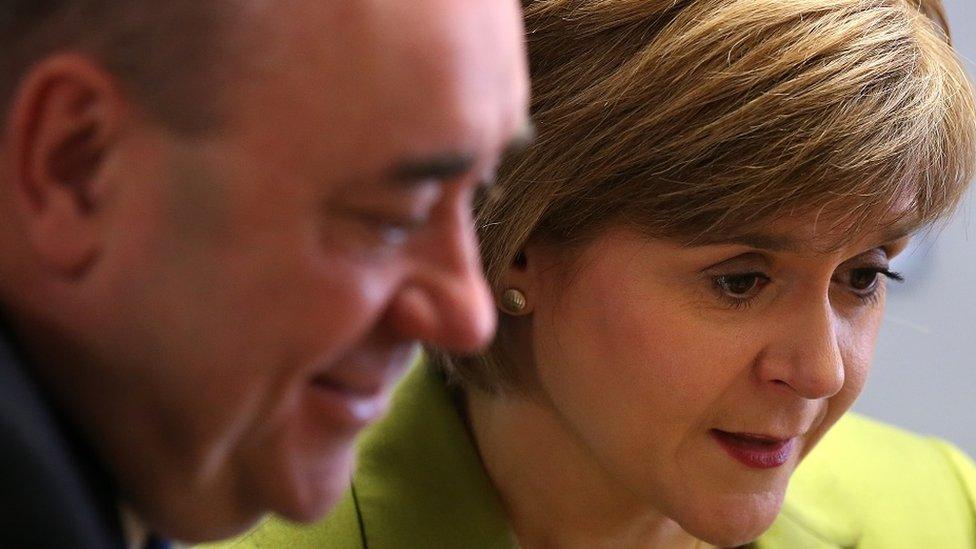Calls for Nicola Sturgeon to quit over Alex Salmond revelations
- Published
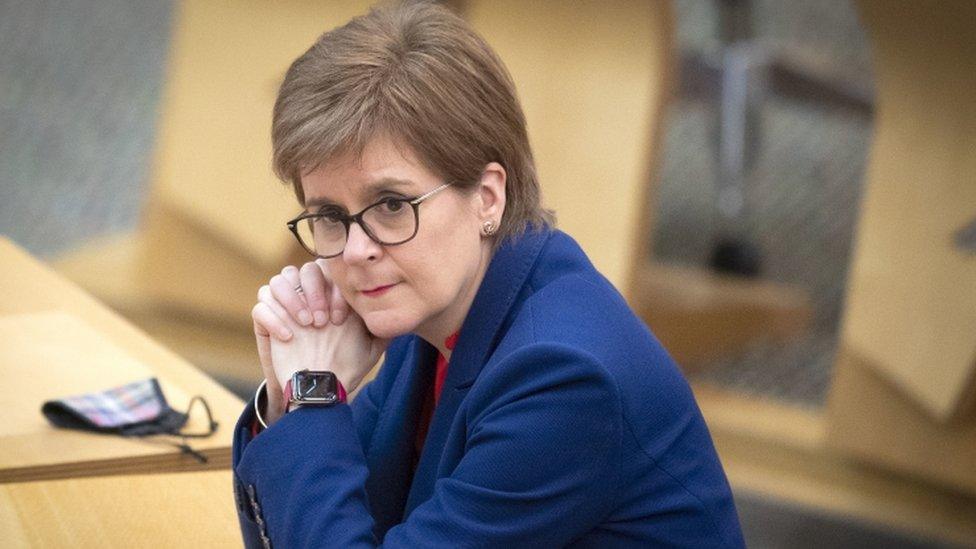
The Conservatives are to submit a motion of no confidence in the first minister
Nicola Sturgeon is facing calls to resign after new documents raised further questions about her involvement in the Alex Salmond saga.
The government has published emails showing it continued a doomed legal fight with Mr Salmond despite its lawyers advising it was likely to lose.
Further evidence from two other witnesses has also called into question Ms Sturgeon's version of events.
Scotland's first minster is to face an inquiry over the affair on Wednesday.
The Scottish Parliament set up a special committee to investigate the mishandling of sexual harassment complaints against Alex Salmond. MSPs heard from the former first minister last week and now it is Ms Sturgeon's turn.
Scottish Conservative leader Douglas Ross said there was "no longer any doubt that Nicola Sturgeon lied to the Scottish Parliament and broke the ministerial code on numerous counts."
He added: "No first minister can be allowed to mislead the Scottish people and continue in office, especially when they have tried to cover up the truth and abused the power of their office in the process.
"The weight of the evidence is overwhelming. Nicola Sturgeon must resign."
The party, which had earlier published a dossier claiming Ms Sturgeon has breached the ministerial code up to 38 times, said it would be submitting a motion of no confidence in the first minister to the Scottish Parliament.
Labour MSP Jackie Baillie said the new documents showed that the government's handling, external of harassment complaints against Mr Salmond had been "indefensible".
But the pro-independence Scottish Greens, who could hold the balance of power in any vote of confidence, said it was "for the committee and the ministerial code inquiry to do the jobs they've been tasked with."
The Liberal Democrats said the new documents "look very serious" for the first minister, but added: "She deserves her day to respond to these allegations before we decide what to do next."
A spokesman for Ms Sturgeon said she would address the issues "and much more besides" at the Holyrood Committee on the Scottish government's Handling of Harassment Complaints, external.
He added: "But to call a vote of no confidence in the middle of a pandemic, before hearing a single word of the first minister's evidence, is utterly irresponsible."
'Alternative reality'
The first minister has denied breaching the ministerial code - the rules setting out how government ministers are expected to behave - and has said she is "relishing" the opportunity to put her side of the story forward at the inquiry.
She has also dismissed Mr Salmond's claims that people close to her - including her husband Peter Murrell, the SNP chief executive - had plotted against him as untrue.
Ms Sturgeon said there was no evidence to back up the allegations and has accused her predecessor of creating an "alternative reality".
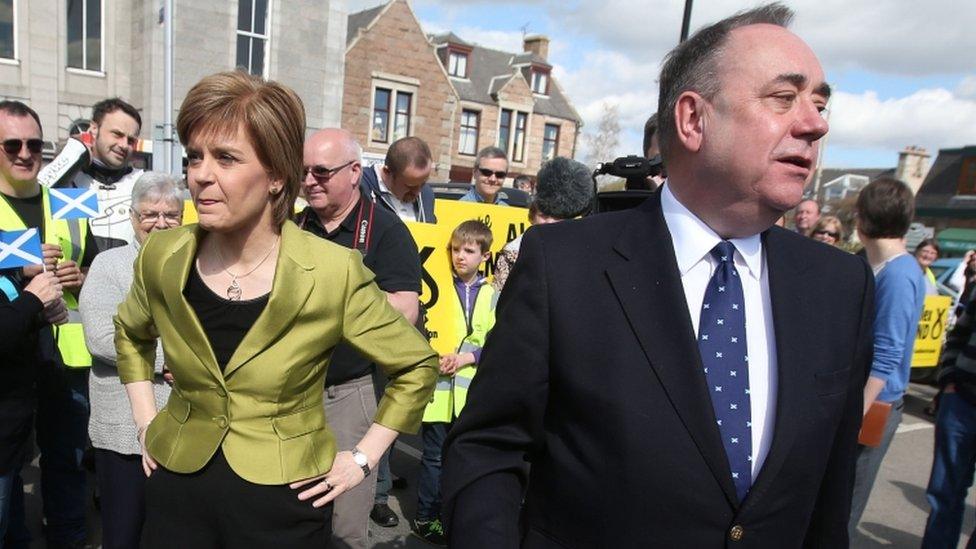
Ms Sturgeon served as Mr Salmond's deputy for many years before succeeding him as both first minister and SNP leader in 2014
A raft of new documents published by the government on Tuesday evening included email advice it had received warning that it was likely to lose a judicial review of its handling of the complaints against Mr Salmond.
Emails showed a senior lawyer was "very concerned indeed" about the case in October 2018, with the government's counsel urging it to admit defeat by 6 December.
But it did not do so until January 2019, when it had to pay Mr Salmond's legal fees of more than £500,000 - on top of its own costs - after admitting its investigation into the allegations had been unlawful.
'Extreme professional embarrassment'
This was because the civil servant tasked with investigating the complaints had already been in contact with the complainers.
Senior lawyer Roddy Dunlop QC said on 31 October that this "presents a very real problem indeed", as it could appear that the investigating officer was "not eligible".
Relations with the external counsel worsened after a series of problems with bringing forward documents to the civil court, with the lawyers writing on 19 December that they had suffered "extreme professional embarrassment" and that the case was becoming "unstatable".
By 28 December the lawyers had threatened to resign from the case, and the government conceded defeat days later.
Mr Salmond was later cleared of 13 charges of sexual assault against a total of nine women after a separate criminal trial at the High Court in Edinburgh in March of last year.


On top of the Covid crisis, Nicola Sturgeon now has a major political crisis to deal with as well.
The Conservative's call for her resignation backed up with plans for a vote of no confidence is a major escalation in political tensions at Holyrood.
If she was to lose a confidence vote, she would be expected to resign as first minister.
The SNP does not have a majority in the Scottish Parliament - the opposition is strong enough to vote down the government, if it so chooses.
However, both Labour and the Liberal Democrats want to wait to hear the first minister's evidence to the Holyrood inquiry before deciding their positions.
My sense is the Greens would not try to oust the first minister before they have seen the findings of two inquiries into her handling of harassment complaints.
That could help to sustain her in office although the parliamentary arithmetic would still be tight.
All of this with just over nine weeks to go to the Holyrood election — where the public will give their verdict on all parties and whoever leads them.

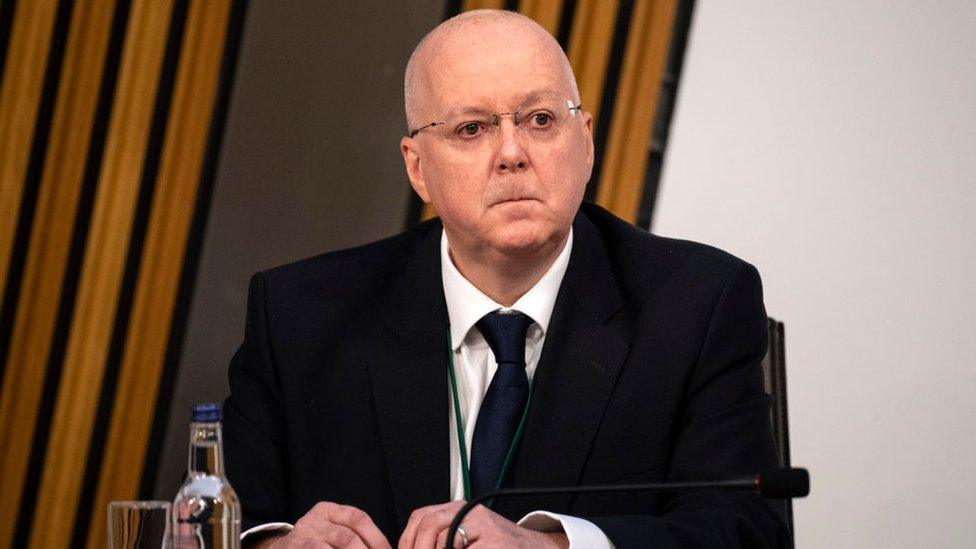
Ms Sturgeon's husband, Peter Murrell, has denied being involved in plotting the downfall of Mr Salmond
The Scottish government had refused to publish the legal advice it had received until opposition parties threatened to have a vote of no confidence in Deputy First Minister John Swinney.
Mr Swinney said the papers showed that legal advice was "optimistic" in the first instance, but that it "became gradually but progressively less optimistic over time".
And he said the government had taken the "right and proper" approach by conceding "within a matter of days" of being told the case was no longer winnable.
The Scottish Conservatives said not all of the government's correspondence with its lawyers had been released, as the inquiry committee and parliament had demanded, and said they would push ahead with a vote of no confidence in Mr Swinney on Wednesday.
Meanwhile, the committee has also published submissions from Duncan Hamilton, external - a former SNP MSP and lawyer for Mr Salmond - and Kevin Pringle, a former SNP communications director.
Mr Salmond had cited both men as backing up his claims about his meetings with Ms Sturgeon, including allegations the name of one of the complainers was passed to Mr Salmond's former chief of staff in a breach of confidence.
Both said they agreed this had happened - despite Ms Sturgeon telling MSPs that "to the very best of my knowledge I do not think that happened".
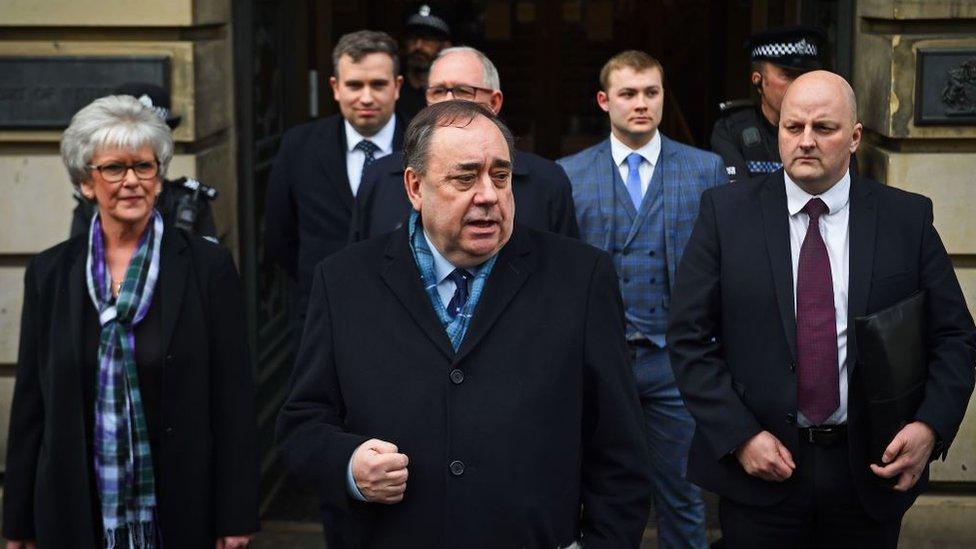
Mr Salmond was cleared of all of the charges against him after a High Court trial last year
Ms Sturgeon has also maintained that she only learned of the complaints against Mr Salmond at a meeting at her home on 2 April 2018 - despite accepting she had met his former chief of staff, Geoff Aberdein, at her Holyrood office on 29 March.
Mr Pringle and Mr Hamilton said they had taken part in a conference call with Mr Aberdein ahead of the 29 March meeting, and said he was clear that "the purpose of the meeting was to discuss the two complaints".
Mr Hamilton was present at the meeting on 2 April, and said that "when we arrived, everyone in the room knew exactly why we were there - no introduction to the subject was needed and no one was in any doubt what we were there to discuss".
The former MSP also insisted that Ms Sturgeon had offered to assist Mr Salmond in seeking mediation with the complainers saying she had told him that "if it comes to it, I will intervene".
However, Ms Sturgeon told MSPs in January 2019 that "I was always clear that I had no role in the process - I did not seek to intervene in it at any stage".
What did Mr Salmond tell the inquiry?
Mr Salmond was SNP leader for a total of 20 years and first minister for seven before being succeeded in both roles by Ms Sturgeon after the independence referendum in 2014.
His long-awaited appearance at the inquiry last Friday saw him claim that "Scotland's leadership has failed" as he called for Mr Murrell and the country's top civil servant, Leslie Evans, to quit and Scotland's top law officer, Lord Advocate James Wolffe, to consider his position.
He alleged that there had been a "deliberate suppression of information inconvenient to the government" throughout the saga, including part of his written evidence to the committee that was removed after a request from the Crown Office despite having already been published by parliament.
Mr Salmond also told the committee that he had been given a memory stick in the build up to his criminal trial that contained messages which involved "pressuring police", "collusion of witnesses" and "construction of evidence because police were felt to be inadequate in finding it themselves".
He described the messages - which are believed to have been handed over to the committee by the Crown Office on Tuesday - as "probably the most shocking thing I have seen in my life".
But he said he could not give any further details because he had been told he could face prosecution if he did so.
- Published23 March 2021
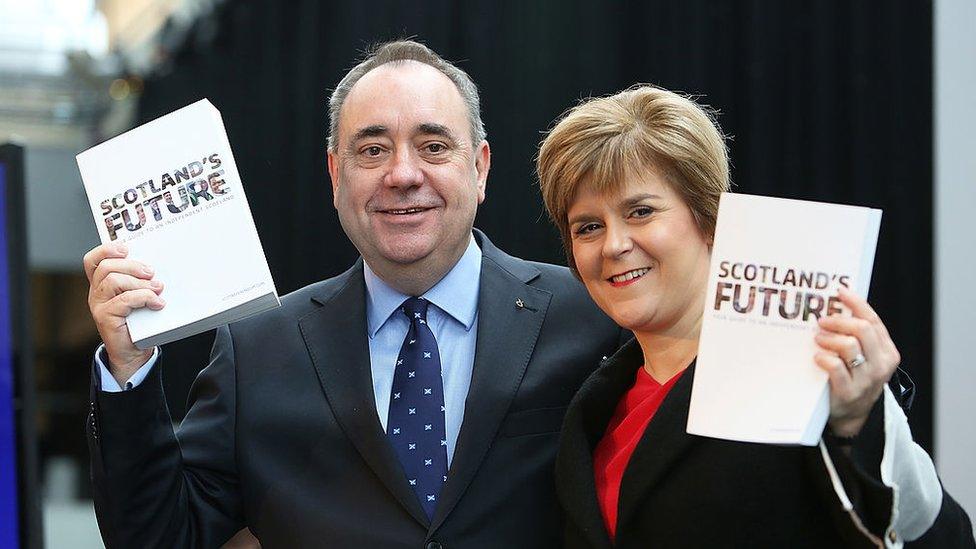
- Published24 February 2021
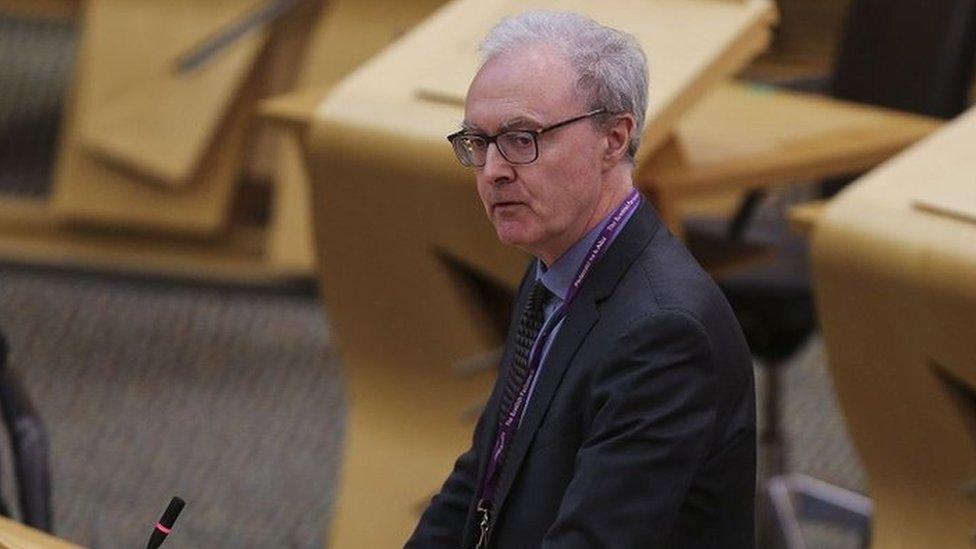
- Published26 February 2021
